- Clone
- 6-His (See other available formats)
- Regulatory Status
- RUO
- Other Names
- 6-His Epitope Tag
- Previously
-
Covance Catalog# AFC-156P
- Isotype
- Mouse IgG1, κ
- Ave. Rating
- Submit a Review
- Product Citations
- publications
| Cat # | Size | Price | Quantity Check Availability | Save | ||
|---|---|---|---|---|---|---|
| 900501 | 1 mL | £433 | ||||
Monoclonal mouse antibody 6-His recognizes the peptide epitope, HHHHHH. This antibody was purified using protein-G chromatography and was subsequently immobilized onto a Sepharose™ Fast Flow matrix.
Product DetailsProduct Details
- Verified Reactivity
- Epitope tag
- Reported Reactivity
- Species independent
- Antibody Type
- Monoclonal
- Host Species
- Mouse
- Immunogen
- Monoclonal 6-His antibody was raised against a recombinant protein containing the sequence HHHHHH.
- Formulation
- Purified IgG immobilized on Sepharose™ Fast Flow beads (in PBS + 0.03% Thimerosal).
- Preparation
- The antibody was purified by affinity chromatography.
- Storage & Handling
- Store between 2-8°C. The matrix may be re-used several times. To strip column after use, wash with several bead volumes of 0.1 M glycine pH 2.8 followed immediately by PBS containing 0.3% Thimerosal or 1mM Sodium Azide as preservative.
- Application
-
Purification, IP
- Recommended Usage
-
Each lot of this antibody is quality control tested by immunoprecipitation.
The optimal buffers and matrix concentration should be determined for each specific assay condition.
Binding: Tagged protein will bind to matrix in common physiologic buffers with pH in the range of 6.0-7.5, salt from 50-500 mM and in the presence of reasonable levels of detergent. Excess reducing agent should be avoided as the disulfide bridges holding antibody heavy and light chains may be compromised. BioLegend tests Affinity Matrix using an equilibration/binding buffer containing:
• 100 mM Tris-HCl (pH 7.5)
• 150 mM NaCl
• 0.1% Tween 20
• 0.5% BSA
• 1 mM beta-mercaptoethanol
Washing: After binding, washes with several bead volumes of buffer are recommended. Such buffer may contain increased salt, altered pH, etc. as determined empirically to remove un-tagged proteins.
Elution: Several options are available for elution.
1. SDS gel loading buffer may be applied directly to the beads in order to display all bound protein on a polyacrylamide gel/western. Note that gel loading buffer containing reducing agent will also release some antibody heavy and light chains (approx 25 and 50kD, respectively).
2. Competitive elution with epitope peptide. For epitope tag affinity matrices, prepare an elution buffer with epitope tag peptide at 400 ug/mL in 50 mM Tris-HCl (pH 7.5), 50 mM NaCl, 1 mM EDTA (pH 8.0).
3. Chemical Elution. Elution by pH or chaotropic salts is also possible. For elution by pH, either 0.1 M glycine pH 2.8 or 40 mM diethyl-amine pH 11.0 may be used. - Application Notes
-
This affinity matrix can be used for immunopurification of 6-His-tagged fusion proteins from crude starting material. On an analytical scale, it can also be used for immunoprecipitating His-tagged proteins.
Sepharose is a trademark of GE Life Sciences -
Application References
(PubMed link indicates BioLegend citation) -
- Field J, et al. 1988. Mol Cell Biol. 8:2159.
- RRID
-
AB_2564996 (BioLegend Cat. No. 900501)
Antigen Details
- Biology Area
- Cell Biology
- Gene ID
- NA
- UniProt
- View information about 6-His on UniProt.org
Related Pages & Pathways
Pages
Related FAQs
Other Formats
View All 6-His Reagents Request Custom Conjugation| Description | Clone | Applications |
|---|---|---|
| Anti-6-His Epitope Tag Affinity Matrix | 6-His | IP,Purification |
| Biotin anti-6-His Epitope Tag | 6-His | WB,ICC,IP |
| FITC anti-6-His Epitope Tag | 6-His | ICC |
| Purified anti-6-His Epitope Tag | 6-His | WB,ICC,IP |
| Direct-Blot™ HRP anti-6-His Epitope Tag | 6-His | WB |
| Alexa Fluor® 647 anti-6-His Epitope Tag | 6-His | ICC |
Compare Data Across All Formats
This data display is provided for general comparisons between formats.
Your actual data may vary due to variations in samples, target cells, instruments and their settings, staining conditions, and other factors.
If you need assistance with selecting the best format contact our expert technical support team.
-
Anti-6-His Epitope Tag Affinity Matrix
-
Biotin anti-6-His Epitope Tag

Western blot analysis of 0.5 µl Posi-tag (Cat. No. 931301) u... 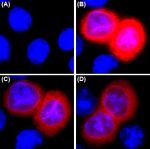
Immunofluorescence of His tagged plasmid transfected A549 ce... -
FITC anti-6-His Epitope Tag
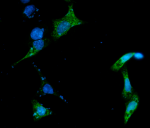
ICC staining of FITC anti-6-His Epitope Tag antibody (clone ... -
Purified anti-6-His Epitope Tag
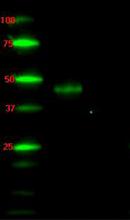
Western Blot showing specificity of 6-His Monoclonal Antibod... 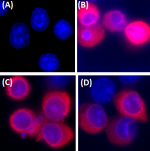
Hela cells transfected with multiple tag plasmid were fixed ... -
Direct-Blot™ HRP anti-6-His Epitope Tag
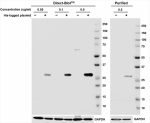
Western blot analysis of 15 µg cell lysates from HeLa cells ... -
Alexa Fluor® 647 anti-6-His Epitope Tag
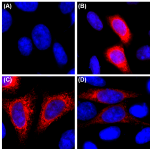
HeLa cells were transfected with (B-D) or without (A) His-ta...
 Login / Register
Login / Register 







Follow Us